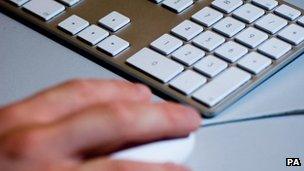Websites' servers hacked to host child abuse images
- Published

Dozens of businesses have been hacked and their computer servers used to host images of child sexual abuse, the Internet Watch Foundation has said.
The charity said legal pornographic sites had also been attacked to redirect users to the illegal material.
The offending material was sometimes accompanied by malware, it said.
The IWF told BBC Radio 5 live it had received 227 reports about the trend over the past six weeks. Some complaints involved the same examples.
Hijacked links
Cambridge-based IWF described the images as showing "the worst of the worst" sexual abuse.
They included images of newborn babies and the rape and violent sexual abuse of very young children, it said.
The charity gave the example of one case in which a furniture business had had the servers it used breached.
It said the attackers had created an "orphan folder" on the computers and then uploaded hundreds of offending images to it - effectively creating a new section on the retailer's website which was not linked to any of its other pages.
The charity said the hackers then hijacked links on "adult" sites so that if a visitor clicked on one of the affected pornographic images or videos they would be directed to the offending material.
It said more than two dozen businesses across the world had had the servers they used compromised, in addition to the furniture seller.
Administrators of the sites involved might be unaware of the problem until someone complained, the IWF added.
"We hadn't seen significant numbers of hacked websites for around two years, and then suddenly in June we started seeing this happening more and more," said the IWF's technical researcher, Sarah Smith.
"We speculate that the motivation behind the hacking is to distribute malware, specifically a Trojan.
"The IWF specialises in removing online child sexual abuse images rather than tracking malware distributors.
"However, you can imagine that an internet user would be worried about taking their malware-infected computer to be fixed knowing it was a folder of child sexual abuse images which caused the problems.
"We know that those people whose computers have been infected were not looking for the criminal content though."
She added that the charity had passed on the information to the police and sister hotlines in other countries.
Children's charity the NSPCC urged anyone coming across abuse images to report them immediately, saying "something like 16% of men in particular" were failing to do so.
"We really encourage them to report it because potentially you'll then have a thumbnail of that image somewhere hidden in your computer system even if you only clicked on it for one second," said spokeswoman Claire Lilley.
Rise in reports
The issue of online images showing the sexual abuse of children has made headlines in recent months after the convictions of Stuart Hazell and Mark Bridger for the murders of Tia Sharp and April Jones.
Both Hazell and Bridger were known to have sought out and viewed child abuse images online.
The IWF said the Hazell and Bridger cases had led to a 42% increase in the number of reports it had received in the past three months, compared with the same period last year.
In June, representatives of a number of internet companies, including Google, Microsoft and Twitter, were summoned to a meeting in Whitehall by Culture Secretary Maria Miller and urged to do more to clamp down on child abuse images on the web.
- Published3 August 2013
- Published18 June 2013
- Published21 July 2013
- Published2 July 2013
- Published20 June 2013
- Published31 May 2013